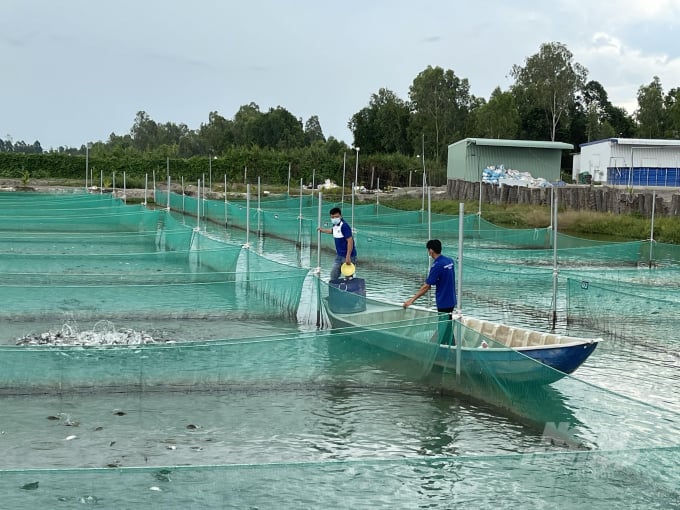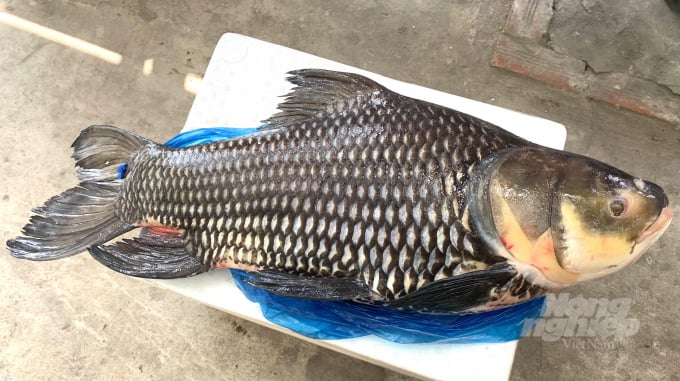June 19, 2025 | 21:44 GMT +7
June 19, 2025 | 21:44 GMT +7
Hotline: 0913.378.918
June 19, 2025 | 21:44 GMT +7
Hotline: 0913.378.918

In Can Tho city, Pham Nghia Company has invested in bronze featherback farming according to GlobalGAP standards. Photo: HD.
According to survey studies, the Mekong River has about 1,200 fish species representing many families, diverse in morphology and lifestyle. Particularly, the Mekong Delta has over 250 species of freshwater fish, of which about 50 species possess high economic value.
However, now only 50-100 species are caught on a regular basis and mainly in lowland areas where there are many inhabitants. It is estimated that in the downstream Mekong region, the volume of inland fishery catches is at least 2 million tons/year (nearly 3 million tons/year at a higher level). Most of the fish caught in the wild are whitefish migrating along the Mekong River.
In the past 30 years, with continuous scientific research efforts of institutes, universities and fisheries research centers in the Mekong Delta’s provinces and cities, now dozens of indigenous freshwater fish species have been artificially reproduced successfully. Of which, there are nearly 20 rare and precious fish species that have the potential to produce seeds and farm commercially to create high economic value.
Theo các công trình nghiên cứu khảo sát, sông Mê Công có khoảng 1.200 loài cá đại diện cho nhiều họ, đa dạng về mặt hình thái và đời sống. Riêng vùng ĐBSCL có trên 250 loài cá nước ngọt, trong đó khoảng 50 loài có giá trị kinh tế cao. Tuy vậy, hiện chỉ thỉnh thoảng có 50-100 loài đánh được thường xuyên và chủ yếu ở những vùng đồng bằng, nơi có nhiều cư dân. Theo ước tính, vùng hạ lưu sông Mê Công sản lượng nghề cá nội địa đánh bắt được ít nhất là 2 triệu tấn/năm và mức cao hơn có gần 3 triệu tấn/năm. Số lượng cá khai thác ngoài tự nhiên chiếm phần lớn là cá trắng di cư theo dòng sông Mê Công.

Many commercial fish households in the Mekong Delta grow freshwater catfish. Photo: HD.
Upon assessing indigenous fish varieties for the development of freshwater fish farming in the Mekong Delta, Assoc. Prof. Duong Nhut Long, Faculty of Fisheries - Can Tho University, said that freshwater fish species including whitefish and field-fish have achieved success in artificial reproduction, but only a few species have been produced and commercially farmed.
According to Assoc. Prof. Duong Nhut Long, the Mekong Delta region’s advantage is the diverse freshwater fish species, full of potential for exploitation that brings great economic benefits, typically tra fish is being developed following the global export commodity chain.
Recent research on artificial reproduction of some fish species has been focusing on some species that are in danger of depletion in order to protect and maintain native aquatic resources, such as: goatfish, ilish, scaly hairfin anchovy... At the same time, the selection and in-depth research on a few varieties of fish with high economic value, capable of high productivity, with output large enough to develop into a commodity chain from expansion of farming areas to farming activities for export is highly essential.
Prospective market observation of some species shows that bronze featherback has few bones, tough and sweet meat is being favored by European customers very much. In regard to farmed eel, the seed has been actively produced, after exploration, the product is favored by markets in many countries. As for snakeheads, bass, Snakeskin gourami, or some other field-fish species, farmers in the Mekong Delta are expanding the farming areas to supply the domestic market.
Research, selection and creation of high-quality agricultural varieties that can adapt to climate change for the region have been integrated into the program on “Research Development and Seed Production in service of the agricultural sector restructuring in the 2021-2030 period” in Decision No. 703/QD-TTg dated May 28th, 2020. The MARD has been directing to improve the research and production ability of agricultural and forestry plant varieties, livestock and aquatic breeds, specifically, the goal of developing three key varieties of the region (aquatic products, fruits, and rice) by 2025 and 2030 is clearly defined.
Translated by Samuel Pham
![Turning wind and rain into action: [9] Digitizing hydrometeorological data in response to climate change](https://t.ex-cdn.com/nongnghiepmoitruong.vn/608w/files/news/2025/06/17/z6704423696987_15fd32ffc26d590d204d520c9dac6786-nongnghiep-165943.jpg)
(VAN) Farmers have begun accessing hydrometeorological applications to adjust their cropping schedules, aiming to ensure productivity and adapt to climate change.
![Turning wind and rain into action: [8] Real-time salinity detection and early warning technology](https://t.ex-cdn.com/nongnghiepmoitruong.vn/608w/files/news/2025/06/17/z6704423696987_15fd32ffc26d590d204d520c9dac6786-nongnghiep-151127.jpg)
(VAN) Thanks to the integration of modern hydrological-hydraulic models, remote sensing technologies, and artificial intelligence, the accuracy of hydrological forecasting has significantly improved.
![Turning wind and rain into action: [7] Early disaster warnings help marine farmers minimize losses](https://t.ex-cdn.com/nongnghiepmoitruong.vn/608w/files/news/2025/06/17/z6704423696987_15fd32ffc26d590d204d520c9dac6786-nongnghiep-142942.jpg)
(VAN) In recent years, thanks to early disaster warnings and forecasting, marine farmers in Khanh Hoa province have been able to reduce risks and losses, thereby improving production efficiency.
![Turning wind and rain into action: [6] ‘Four on-the-spot’ disaster management software](https://t.ex-cdn.com/nongnghiepmoitruong.vn/608w/files/news/2025/06/17/e5a48259d6a262fc3bb3-nongnghiep-183800.jpg)
(VAN) By simply activating the scenario on the disaster management software, the relevant authorities immediately know how many households need to be evacuated, where to evacuate them to, and by what means of transportation…
![Turning wind and rain into action: [5] Hue applies modern technology in disaster forecasting](https://t.ex-cdn.com/nongnghiepmoitruong.vn/608w/files/news/2025/06/17/z6704423696987_15fd32ffc26d590d204d520c9dac6786-nongnghiep-093938.jpg)
(VAN) In Hue city, modern technology has recently been applied in meteorological and hydrological forecasting and warning, helping to reduce the damage caused by natural disasters.

(VAN) A cutting-edge farming technique being implemented on an experimental ranch in Arizona's Sonoran Desert has already saved a billion gallons of water over five years, according to Civil Eats.

(VAN) Poultry and pig production and the environment can be boosted through enhanced water technology, according to new research.